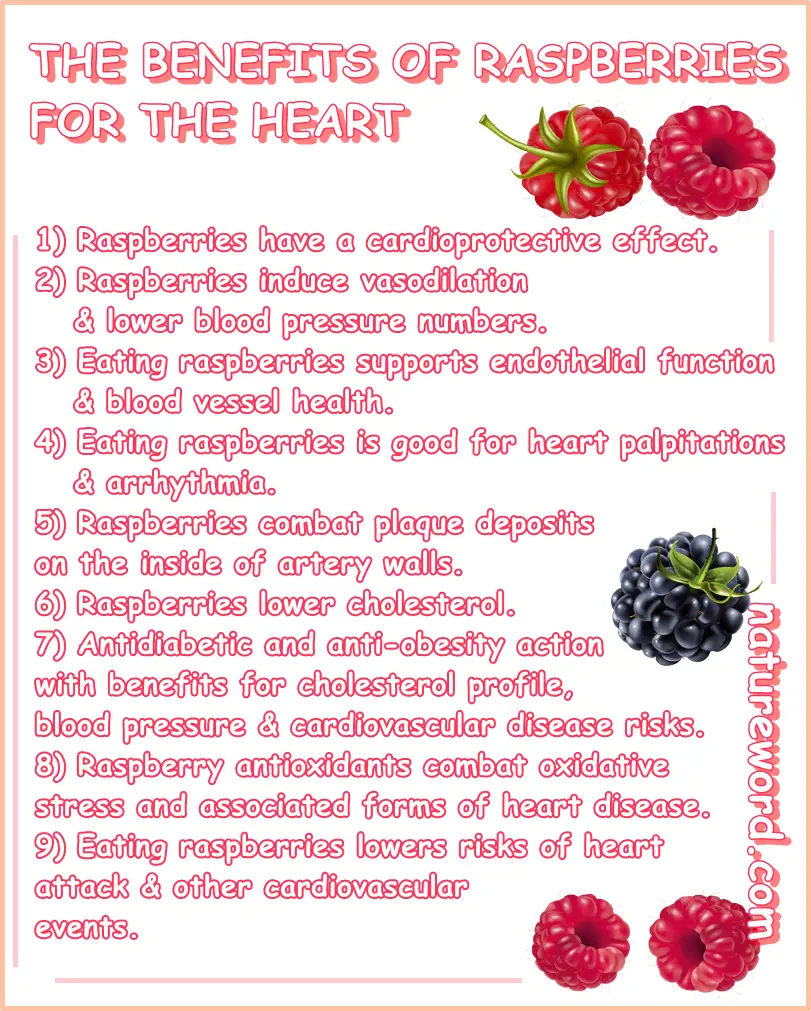Raspberry season is coming to an end with the month of September being last call for late season raspberries, the bulk of which is represented by red raspberries.
There are many benefits of eating raspberries, with cardiovascular benefits taking precedence.
Regular consumption of the berries, when part of an overall clean and balanced diet, produces both immediate and long-term benefits for the heart and vascular system.
Eating raspberries provides important amounts of dietary fiber to the diet which holds direct benefits for blood cholesterol numbers and profile.
Raspberries help lower blood pressure numbers that are too high and have a good content of vitamin C which contributes to cleaner arteries for overall good vascular health.

How are raspberries good for the heart?
1) Raspberries have a cardioprotective effect
Did you know that raspberries have a cardioprotective action? The antioxidant, anti-inflammatory and metabolic benefits derived from various constituents in raspberries such as anthocyanins, resveratrol, ketones, dietary fiber and essential vitamins all exert a protective action on the heart and vascular system.
The cardioprotective effect is owed to bioactive constituents in the berries positively modifying several cardiovascular parameters, notably blood pressure and blood cholesterol, as well as metabolic parameters such as post-meal blood glucose levels.
The capacity of raspberries, and other berries, to prevent cardiovascular diseases has been established in animal models as well as human clinical trials (source).
2) Raspberries induce vasodilation and lower blood pressure numbers
While eating raspberries will not offset the effects of a bad diet high in sodium and processed foodstuff, just adding the berries to your regular diet will bring in healthy constituents with proven anti-hypertensive benefits.
For one, raspberries have magnesium and potassium which promote vasodilation and release pressure in blood vessels, actively contributing to lowering blood pressure numbers.
Raspberry juice can provide more potassium and magnesium to the diet compared to the whole fruit, as well as additional water to flush out excess sodium which can translate into stronger anti-hypertensive benefits, including benefits for water retention and associated swelling of the arms, legs and face puffiness. Find out more about the benefits of drinking raspberry juice.
In addition to this, animal studies show raspberry ketones actively lower blood pressure, with measurable effects on both systolic and diastolic blood pressure (study).
In addition to normalizing blood pressure, ketones and other bioactive polyphenol constituents in raspberries represent an ‘efficient cardioprotective strategy in hypertension-induced heart failure’, according to research (source).

3) Eating raspberries supports endothelial function and blood vessel health
Raspberries of all colors boast a good content of vitamin C. One of the main functions of vitamin C is it stimulates the production of collagen in the body.
Collagen is a protein that provides structure to most tissues and organs in the body, from bones and teeth to skin and blood vessels. Not just this, but vitamin C is anti-inflammatory, combats oxidation and modulates the immune system response.
A higher vitamin C intake is associated with reduced risk for cardiovascular diseases, according to the Atherosclerosis Journal. Getting enough vitamin C in the diet has been shown to support and actively restore endothelial function.
Not just this, but human trials have shown vitamin C supplementation (500 to 2000 milligrams per day) produces ‘significant improvements in endothelial function’, with ‘stronger effects in those with (existing) cardio-metabolic disorders’ (source).
How much vitamin C in raspberries? On average, a serving of 100 grams of fresh raspberries provides close to 30% of the entire daily values of vitamin C for the average adult. A serving of 200 grams accounts for close to 60% of total daily vitamin C requirements for an adult.
4) Eating raspberries is good for heart palpitations and arrhythmia
Thanks to the berries’ good content of vitamins B9 and B6. Vitamin B9 and vitamin B6 are needed to produce red blood cells and hemoglobin, the component in red blood cells that binds and transports oxygen to all muscles in the body, including the heart and other breathing muscles. Not just this, but vitamin B6 boosts the capacity of hemoglobin to absorb oxygen.
A deficiency causes tiredness and fatigue, muscle weakness and symptoms such as shortness of breath, arrhythmia and palpitations. Eating raspberries provides good amounts of both B vitamins and combat the side effects, maintaining a good level of vitality and normal heart rhythm and respiratory function.
Bananas have just as much vitamin B9 as raspberries and roughly 7 times more vitamin B6.
Find out what are other reasons to eat more bananas.
The content of magnesium and potassium in raspberries further contributes to their anti-arrhythmia benefits.
Arrhythmia is caused by problems with the electrical conductive system of the heart and getting enough electrolytes such as potassium and magnesium helps maintain a vital balance that supports regular contractions of the heart. Raspberry juice is also a great option.
5) Raspberries combat plaque deposits on the inside of artery walls
Atherosclerosis is a form of heart disease caused by the accumulation of plaques on the inside of artery walls causing loss of elasticity, narrowing of the arteries and restricted blood flow.
Atherosclerosis has serious implications for health, raising risks of life-threatening cardiovascular events such as heart attacks and strokes.
Plaques are made up of byproducts of inflammation processes, predominantly inflammatory cells, calcium, fatty material (lipids, cholesterol, fat) and other elements.
Modifiable risk factors include poor quality of diet, excess eating, excess body weight, diabetes, high blood pressure, high cholesterol.
Eating raspberries on a regular basis can help improve risk factors and prevent atherosclerotic plaques. For one, raspberries are naturally high in vitamin C which is a proven natural anti-inflammatory agent, actively lowering levels of several inflammation markers in the body. Not just this, but vitamin C stimulates the production of collagen for blood vessel elasticity.
Vitamin C further combats atherosclerosis via its immune system regulating action which consists of modulating the inflammatory immune system response and antioxidant effects which counteract fat oxidation, limiting the amount of source material contributing to plaque buildup.
‘An increasing number of preclinical studies in trauma, ischemia/reperfusion, and sepsis models show that vitamin C administered at pharmacological doses attenuates oxidative stress and inflammation, and restores endothelial and organ function’, further adding to its wide range of cardiovascular benefits (source).
Furthermore, raspberries are naturally a good source of vitamin K with 6.5% of total daily values in just 100 grams of the fruit. Vitamin K is a recognized anti-atherosclerotic agent which actively and measurably combats vascular calcification conducive to atherosclerosis and heart disease.
Research shows ‘vascular calcification is intimately associated with cardiovascular events and mortality and is a chronic inflammatory process’. ‘Vitamin K has been demonstrated to exert anti-inflammatory effects (…) in both in vitro and in vivo studies, suggesting that vitamin K may prevent vascular calcification via anti-inflammatory mechanisms’ as well as ‘inhibit progression of vascular calcification’ (source).
6) Raspberries have a cholesterol-lowering action
Eating raspberries promotes healthy cholesterol levels and a healthier cholesterol profile with long-term benefits for cardiovascular health.
For one, the berries are high in dietary fiber with 6.5 grams of fiber for every 100 grams of fruit. Dietary fiber is a direct modifier of blood cholesterol parameters.
Dietary fiber binds to fat from food and slightly reduces its absorption; it satiates and prevents overeating, with benefits for weight control and weight loss; dietary fiber also influences gut microbiota with further benefits for weight management. Not just this, but it exerts a regulatory action on blood sugar metabolism, among other effects.
Its regulatory effects on digestion and metabolic parameters translate into healthier cholesterol levels and a healthier cholesterol profile with lower LDL, triglycerides and total cholesterol levels.
Moreover, the good amounts of vitamin B5 in raspberries further exert a cholesterol-lowering action, while vitamin C in the fresh fruit and juice combats inflammation and prevents lipid peroxidation for added benefits for blood cholesterol profile.
Not just this, but research has found bioactive constituents in raspberries called ketones ‘can serve cardio protective roles’ as well, reducing cardiac tissue damage and improving blood lipid profiles in animal studies (study).
7) Antidiabetic and anti-obesity action with benefits for cholesterol profile, blood pressure and cardiovascular disease risks
Diabetes is a metabolic disease with severe cardiovascular implications in the form of high blood pressure, high cholesterol levels, a poor blood cholesterol profile and associated cardiovascular events. The metabolic disease is supported by obesity. The antidiabetic benefits of fruits such as raspberries contribute to the normalization of metabolic parameters and weight management for better cardiovascular health.
Low in calories, very low in fat and high in dietary fiber, raspberries represent a healthy food option that is excellent for weight control and weight loss. The loss of excess body fat can help modify metabolic risk factors and improve blood pressure and blood cholesterol numbers and profile, with long-term benefits for cardiovascular health.
Raspberry ketone RK; 4-(4-hydroxyphenyl)-2-butanone is widely recognized for its weight loss benefits, both preventing weight gain and favoring weight loss via an appetite-suppressing action and modulation of the ‘expression of lipolytic and adipogenic genes’ (study 1, study 2).
Furthermore, Urolithin A obtained from the digestion of ellagitannins in raspberries by gut bacteria, has been found to exert anti-obesity effects by enhancing the thermogenesis of fat tissue. Thermogenesis is the physiological production of heat that results in increased energy consumption, and favors weight loss. Not just this, but animal studies show treatment with Urolithin A ‘prevents diet-induced obesity and metabolic dysfunctions in mice without causing adverse effects’ (study).
Eating raspberries also holds benefits for the activity of beta cells in the pancreas. Treatment of diabetic mice with Urolithin A ‘restored cell viability’ in pancreatic cells by activating autophagy, reducing cell death (study). This translates into a protective antidiabetic effect with benefits for cardiovascular health.
Raspberries are further a low glycemic food with limited effects on blood sugar metabolism, when consumed reasonably, and have a high content of dietary fiber to help with blood sugar control and satiation. Their nutritional makeup directly contributes to the normalization of metabolic parameters for good cardiovascular health.
8) Raspberry antioxidants combat oxidative stress and associated heart diseases
Colorful fruits such as raspberries are known for their high content of antioxidants, including anthocyanins, xanthophylls, resveratrol and more.
Red raspberries, purple raspberries and especially black raspberries are high in pigmented antioxidants called anthocyanins, while yellow raspberries are high in pigmented carotenoid antioxidants called xanthophylls.
Among their many benefits for health, antioxidants in the fruit counteract lipid peroxidation and associated inflammation and oxidative cell damage, actively contributing to cardiovascular health. Oxidative damage causes cardiac remodeling that, over time, promotes heart disease.
Studies show antioxidants in raspberries can help decrease ‘levels of oxidative and inflammatory stress that promote morphological changes in the heart at an older age’.
Eating raspberries can help prevent or delay heart diseases (source), with the potential for lifespan extending effects.
9) Eating raspberries lowers risks of heart attack and other cardiovascular events
Berries in general contain bioactive polyphenols whose capacity to prevent cardiovascular diseases has been established recently in animal models as well in human clinical trials.
Ketones in raspberries exert notable cardioprotective effects and have been proposed to help reduce risks of myocardial infarction (heart attack).
Ketones, anthocyanins, ellagitannins, but also nutritional elements such as vitamin C, dietary fiber, vitamin K and B vitamins in the berries are being considered for their role in preventing atherosclerosis.
